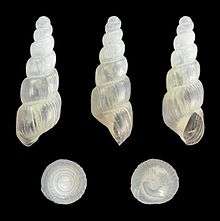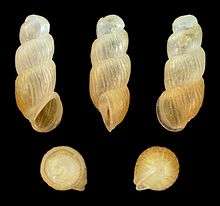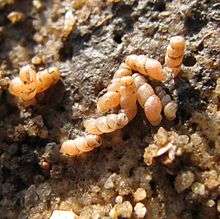Truncatella subcylindrica
Truncatella subcylindrica is a species of small land snail that lives at the edge of the sea. It has gills and an operculum and is gastropod mollusk or micromollusk in the family Truncatellidae.
| Truncatella subcylindrica | |
|---|---|
| Two live individuals of Truncatella subcylindrica: a juvenile on the left, and an adult on the right | |
| Scientific classification | |
| Kingdom: | |
| Phylum: | |
| Class: | |
| (unranked): | |
| Superfamily: | |
| Family: | |
| Subfamily: | Truncatellinae |
| Genus: | |
| Species: | T. subcylindrica |
| Binomial name | |
| Truncatella subcylindrica (Linnaeus, 1767) | |
| Synonyms | |
| |
Description


This species of snail has a shell which is light in color, and which can reach 5 mm in length.[1]
Like all other species in this genus, the shell loses its apical whorls as it grows, giving it a truncated and cylindrical appearance.[2][1]
Distribution
This snail is native to areas of the northeastern Atlantic coastline, from Morocco and the Mediterranean coast to the Black Sea.[1] This native distribution includes Great Britain.
There are also some early records from the late 1800s for the eastern United States, on the coast of Newport, Rhode Island, where it was presumably introduced.[1]
Habitat

This species is found in marine coastal environments, near or just above the high tide line on stones and pebbles, fine sediments and decomposing vegetation.[1] It prefers the edge of sheltered waters where the salinity is at 18–40 psu.[1][2]
Life cycle
The sexes are separate.[1] Fertilized eggs are laid as egg capsules, which are attached to detritus.[1][2]
References
This article incorporates public domain text from the reference[1]
- Benson A. (2008). "Truncatella subcylindrica". USGS Nonindigenous Aquatic Species Database, Gainesville, FL. Revision Date: 22 April 2004.
- White N. (1999). Truncatella subcylindrica. Looping snail. Marine Life Information Network: Biology and Sensitivity Key Information Sub-programme [on-line]. Plymouth: Marine Biological Association of the United Kingdom. [cited 19 June 2003]. Available from: <http://www.marlin.ac.uk/species/detail/1206. (link not available 20 October 2008, cited from USGS)
External links
![]()